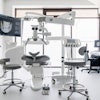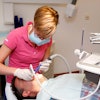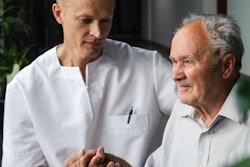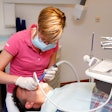
Adding to the literature on oral healthcare in long-term care facilities, researchers have found that training on the subject was lacking among care staff at six such facilities in New England, according to a presentation at the recent International Association of Gerontology and Geriatrics (IAGG) 2017 World Congress in San Francisco.
Less than 10% of direct care staff at the long-term care facilities had received oral healthcare training, according to the administrative staff surveyed. Based on the survey results, more interprofessional education is necessary to improve the care of these residents, the researchers noted.
"While the provision of good oral health is important in long-term care settings, there are key considerations for implementing oral health education efforts, including the need for increased understanding of interprofessional oral health roles," they wrote in their poster presentation.
The research was led by Jennifer Crittenden, MSW. Crittenden and colleagues are affiliated with the University of Maine Center on Aging and the Lunder-Dineen Health Education Alliance of Maine.
Knowledge gaps
It is well-recognized that oral healthcare in some long-term care facilities is not of the highest quality. So to identify knowledge gaps and opportunities for oral healthcare education for staff in these facilities, researchers surveyed the administrative staff of six long-term care homes in the New England region. They also sought to identify how to best improve staff knowledge, skills, and attitudes about oral healthcare.
“There are key considerations for implementing oral health education efforts, including the need for increased understanding of interprofessional oral health roles.”
In addition to the staff survey, each site also received an in-person briefing and orientation before starting the survey.
The researchers reported that a majority of those surveyed indicated that direct care staff do not receive oral healthcare training during their initial orientation. Those surveyed also responded that they received oral healthcare education only "rarely."
Almost 50 of the survey respondents answered the question of what percentage of their staff had received oral healthcare education as part of their training/education before starting work. The greatest number (13) responded that less than 10% of their staff had received such training, while 11 responded that more than 75% of their staff had received this training.
Further, only a little more than half of healthcare staff at the facilities agreed with the survey statement that every member of the staff has a clear role in providing oral healthcare to residents.
The findings showed a need for an increased understanding of interprofessional roles and oral healthcare education and knowledge, the researchers concluded. They also acknowledged a need for training and tools that take into account so-called "frontline realities" of long-term direct care.
MOTIVATE program
The results are being used by Maine's Oral Team-based Initiative: Vital Access to Education (MOTIVATE), which was established to enhance oral healthcare in these facilities.
"The pilot project centers on using an innovative, interprofessional, evidence-based, and sustainable educational model," the researchers concluded.



















